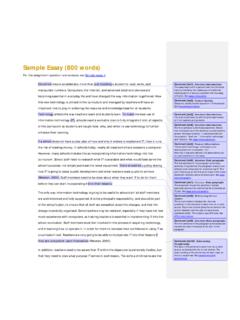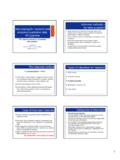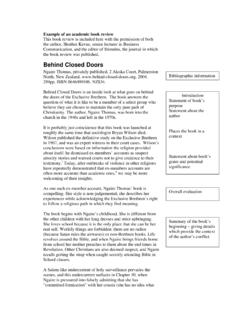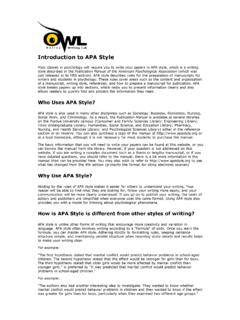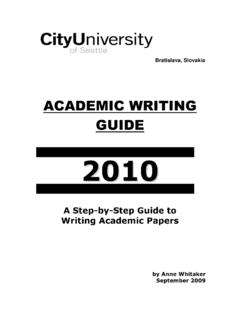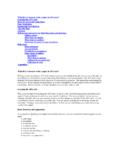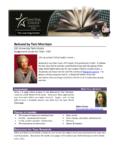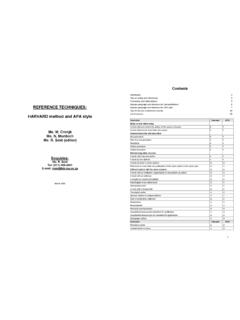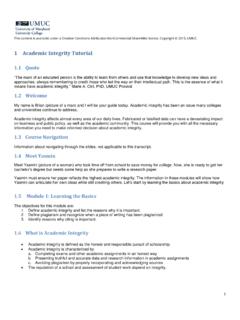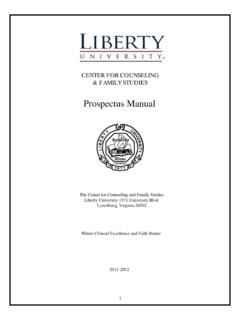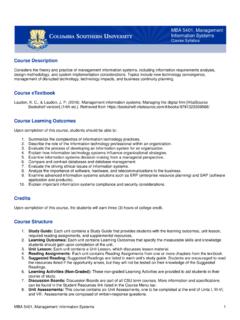Transcription of Student Learning Development Services Academic …
1 Student Learning Development ServicesAcademic Writing0800 MASSEY (627 739) writing : A Guide to Tertiary Level writing | iAcademic writing :A Guide to Tertiary Level WritingEdited by Dr Natilene Bowker 2007ii | Academic writing : A Guide to Tertiary Level WritingWelcome to Academic writing !This resource has been designed for Massey University students who are new to the conventions of Academic writing . Many students , including extramural, internal, and both domestic and international, may fi nd this book useful, especially as the examples provided are not limited to a specifi c discipline. The book offers advice and guidance on how to write university assignments, including a section on the writing process with particular reference to essays. Another section deals with the basics of report writing , incorporating sub-sections on business report writing as well as lab report writing . When writing university assignments, referencing the work of others is integral, hence there are sections on integrating the opinions of authors into your assignments, as well as how to construct a Reference List at the end of your assignment.
2 As a Student for many years, as well as an Academic author of research publications, I have designed the book to help new students with their journey into Academic writing . Rather than becoming aware of the features of Academic writing through trial and error, as I have done, it is hoped that this resource will fast track you through to many of the key requisites underlying Academic assignments. Indeed, that is why there are sections introducing you to marking guides, and lecturers and course co-ordinators expectations surrounding university assessments. Further, having personally experienced the paralysing effects of procrastination and perfectionism, I have added some advice and guidance, towards the end of the book, for managing these commonly encountered obstacles to successful writing . A fi nal section provides a range of resources focusing on grammar skills and the spelling of diffi cult words.
3 While I have compiled, edited, and revised the book, in addition to contributing many sections, other staff, past and present, from the Palmerston North Student Learning Centre deserve acknowledgement. Sections of this book derive from Anne-Marie Tokley s (2002) Academic writing booklet, and Heather Kavan s (2003) revised edition. Several pages of this book have been reproduced from the Student Learning Centre s resource handouts (prepared by Lisa Emerson, Grant Harris, Emmanuel Manalo, Yumiko Olliver, and others whose names do not appear), in addition to Christopher Van der Krogt s (2001) Academic writing Study Guide. Please forward any comments or suggestions on improvements for future editions to the Student Learning Centre, Massey University, Private Bag 11-222, Palmerston North, ph. (06) 350-2251, fax (06) 350-5760, or email . For more information on planning, drafting, and revising Academic assignments, Student Learning Centre staff from all three Massey University campuses are available for guidance and support.
4 writing is a diffi cult process. Hopefully, though, if you are able to read and refl ect on the ideas and suggestions offered in this book, the process will develop into a more manageable and rewarding experience. Best wishes on your journey into Academic writing . It can be a life changing experience, as mine has Natilene BowkerAcademic writing : A Guide to Tertiary Level writing | iiiTable of ContentsWelcome to Academic writing ! .. iiTable of Contents .. iiiAcademic WritingSome Differences between Academic writing and Other writing Contexts .. 2 Why Should You Develop Good writing Skills? .. 5 Citing and ReferencingIdentifying Academic Sources .. 8 Integrating the Ideas of Published Authors .. 9 Citing Authors .. 9 Author Citation Tips .. 9 Putting Authors Ideas into Your Own Words .. 12 Summarising .. 12 Paraphrasing.
5 13 Copying and Changing a Few Words Not Paraphrasing .. 14 Things to Note about Acceptable Paraphrasing .. 15 When to Retain SOME of the Original Features .. 16 Techniques for Putting Authors Ideas into Your Own Words .. 16 Verb List for Academic writing .. 16 Changing the Sentence Structure and Form .. 17 Steps for Putting Authors Ideas into Your Own Words .. 19 Quoting Authors Ideas .. 21 Quotation Tips .. 21 When to Use Quotations or Your Own Words? .. 23 Integrating Quotations into Your Assignment .. 23 The Importance of Acknowledging Authors Ideas .. 26 When Don t You Need to Acknowledge Authors? .. 26 Reference 27 Details to Include in Your Reference List .. 27 Referencing a Book .. 28 Referencing a Chapter within an Edited Book .. 28 Referencing a Journal Article .. 28 Diffi cult References.
6 29 Online Documents .. 29 Formatting Your Reference List .. 30 EssaysThe writing Process .. 32 The Importance of Planning an Assignment .. 33 Interpreting the Topic .. 34 Common Key Task Words in Assignments .. 34 Essay Structure .. 36 Plans, Introductions and Thesis Statements .. 37 Guidelines for writing a thesis statement .. 38 Paragraphs .. 38 Conclusions .. 40 Strategies for Organising Points in Assignments .. 40 The Process of Revision .. 42 Editing .. 43 Proofreading .. 43 Layout .. 44 Sample Essay I - 800 words .. 45 Sample Essay II 2000 words .. 50 ReportsBasic Report writing .. 62 What Is a Report? .. 62 Having a Pre-Defi ned Structure .. 62 Having Independent Sections .. 63iv | Academic writing : A Guide to Tertiary Level writing Reaching Unbiased Conclusions.
7 63 Deciding on the Report s Structure .. 63 Flat Structure .. 63 Hierarchical Structure .. 64 General Specifi c Structure .. 64 Relationship Structures .. 64 Techniques for Carrying Out Your Analysis of the Issues .. 65 Developing a Report writing Style .. 66 Tips on Being Concise in Your writing .. 67 Tips on Being Objective in Your writing .. 68 Example of a Report .. 69 Basics on Business Report writing .. 80 What Is the Purpose of writing a Business Report? .. 80 What Are the Typical Sections of a Business Report? .. 80 What Is the Difference between an Inductive and a Deductive Report? .. 80 Managing the Introduction section .. 81 Managing the Discussion section .. 81 Managing the Conclusions section .. 82 Managing the Recommendations section .. 82 Qualities of an Effective Business Report.
8 82 Resources on Business Report writing .. 82 Basics on Lab Report writing .. 83 What Is the Purpose of writing a Lab Report? .. 83 What Are the Typical Sections of a Lab Report? .. 83 Managing the Abstract .. 84 Managing the Introduction section .. 84 Managing the Method section .. 85 Managing the Results section .. 85 Managing the Discussion section .. 86 Resources on Lab Report writing .. 86 Resources on Scientifi c Report writing .. 86 Critical ThinkingBeing Critical .. 89 What Does Being Critical Really Mean? .. 90 What is Available for Critique .. 91 Steps for Developing Critical Thought .. 92 Organising Your Critique .. 93An Introduction to Marking Guides .. 94 Getting an A on Your Assignment .. 95 Scope of Assignment .. 95 Evidence of Reading .. 95 Structure .. 95 Presentation.
9 96 Hierarchy in Assessment Tasks .. 97 Other Useful TipsDealing with Feedback on Assignments .. 100 Procrastination .. 102 Parts of Speech .. 103 Common Errors in Grammar and Punctuation .. 104A Checklist for Proofreading .. 104 Tricky 107 Strategies for Improving Spelling .. 109 Differences between British and American Spelling .. 112 References .. 114 Academic writing : A Guide to Tertiary Level writing | 1 Academic Writing2 | Academic writing : A Guide to Tertiary Level WritingSome Differences between Academic writing & Other writing ContextsWriting is a skill that is required in many contexts throughout life. For instance, you can write an email to a friend or refl ect on what happened during the day in your personal diary. In these kinds of interpersonal settings (or intrapersonal in the case of a diary record), the aim may be to communicate the events that have happened in your life to someone close to you, or to yourself.
10 Opportunities abound for personal refl ection. It is expected that in writing about these life events, you will include your personal judgements and evaluations, which may be measured by your feelings and thoughts. The personal stories you write in a diary or email to friends can be written down at the moment they enter your mind. There is no need to follow a structure, as prose on the page or the computer screen appears through freely associated ideas. Similarly, another quality of writing in personal contexts is that it is typically informal, so there is no need to adhere to structures of punctuation or grammar (although your reader may be quite appreciative if you do so). In these settings, it is perfectly acceptable to deploy colloquialisms, casual expressions, and abbreviations, like that s cool , by the , slacker , Palmy , b4 , and thru . In contrast, Academic writing does many of the things that personal writing does not.


